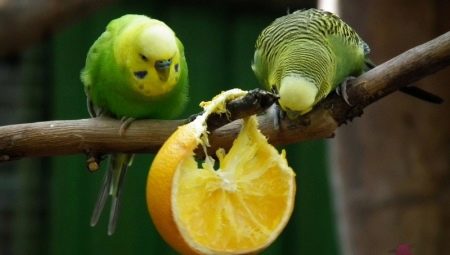Too many owners feed their budgies to purchased cereal feed and make a big mistake. Such a bird’s diet is not predetermined by nature, and this is extremely small in order for the bird to receive all the necessary vitamins and minerals for a healthy life. Ornithologists insist that the fruit should be the basis of the diet of parrots.
List of allowed fruits
When you decide to tame a budgie, you need to understand that the happiness of owning a pet carries with it responsibility for his health and life, since the bird depends entirely on the care and proper organization of the diet that the owner can provide. Many of us like to pamper our pets with sweets and fruits, often not realizing that forbidden fruits or berries when consumed as food can do irreparable harm to our health, and sometimes even to the death of a feathered one. Therefore, it is necessary to stock up on a rich arsenal of knowledge in order to avoid harmful treats.
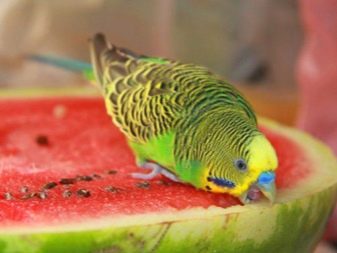
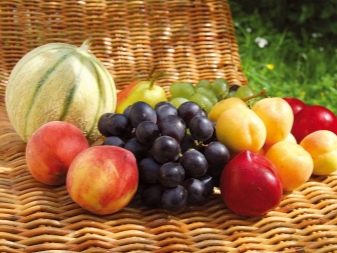
So, parrots need to give such fruits.
- Citruses (oranges, tangerines, lemons) - A real treasury of vitamins, acids, fiber and easily digestible carbohydrates. Contain magnesium and potassium. Correct use: peel, as it accumulates a lot of toxins when growing the fruit, cut into small pieces, and provide a supply of water near the bird. And still be careful, after all, fruits are allergens. Mandarins from all citrus fruits are the least “insidious”. To get started, give the pet quite a bit of goodies and monitor the condition if there is an organism reaction. If all is well, then citrus fruits must be in the diet.
- Apples (any grades) - contain vitamins B and C, tannins, fibers. Proper use: can not be given with a peel, it must first be cut off. You also need to remove all rotten places and blackening from impacts, bones must be removed. For a wavy variety of parrots, the daily limit of apples should not exceed one sixth of the entire fruit. Apples need to be crushed or grated. It is recommended to invent variations of use - to extinguish, dry or soak the fruits in water.
- Pears - contain sugars (fructose and glucose), vitamins A, P, PP, C, B1, B2, E, magnesium, folic acid, fluorine, nitrogenous substances and iron. Proper use: cut into small squares the thickness of the little finger, peeling.
- Watermelons - rich in potassium and magnesium, cleanse the body and, undoubtedly, are useful for the urogenital system of birds. Proper use - cut into small slices.
- Melons - just one serving of melon replaces the daily requirement for vitamin A. Also, the melon is rich in phosphorus, sodium, potassium and iron. Beneficial effect on the digestive system. Proper use - cut into slices. Try to give wavy friends only when the melon season is coming.
- Fruits and berries with a stone inside (sweet cherry, bird cherry, cherry, plum, peaches, cherry plum, apricot) - contain a lot of fiber, sugars and vitamins. Proper use - offer stone fruit types both fresh and in the form of dried fruits. Be sure to remove the stone.
- Other berries - A source of vitamin C and many other beneficial elements. Just needed in the diet of birds. Proper use: in normal or frozen form (if not season). If the berries are frozen, pre-thaw, slightly warm. If the berries are dried, dip in water for a while, so that they soften.
- A pineapple - the fruit contains a lot of manganese, which together with calcium is needed to strengthen and restore bone tissues and increase their strength. Correct use - core, finely chop.
- Grape - rich in sugars and carbohydrates, calcium, B vitamins, fiber. Proper use: you can give grapes with seeds of different varieties, avoid only sweet varieties. Giving grapes 3 times a week will be more than enough.
- Garnet - one of the most useful fruits for wavy pets. It is a leader in the content of iron, ascorbic acid, rich in vitamins of group B, A, PP. Proper use: starting with a couple of grains, bring a portion to 10, but not more so as not to get a laxative effect or an allergic reaction.
- Banana also not poor in vitamins and minerals, everyone knows that bananas are rich in potassium, sugar and starch. Proper use: can be given in pieces in different variations (fresh, dried or dried). Of course, the peel should be removed from the banana, cut into small pieces and put in the trough for your parrot. Do not forget about the fact that bananas are very high in calories and if they are constantly consumed in large quantities or overeating, the parrot can quickly get fat. Do not assume that since the pet lives in your house and does not need to fly in the wild, then weight is not a particularly important factor. Completeness very quickly leads to heart disease and causes the death of budgies.
- Kiwi - very rich in vitamin C, helps to better absorb iron and contributes to the rapid healing of wounds. Kiwi also contains vitamin E, which is an excellent antioxidant, lowers cholesterol and boosts bird immunity. Proper use: cut into slices, peel.
- Mango - in nature, parrots in large quantities absorb mango and feed it with the pulp of chicks. The fruit contains many beta-carotene, B vitamins, as well as minerals and salts: potassium, calcium, manganese, iron, phosphorus.This king of fruits is rich in pectin and is high in fiber. Proper use: when giving mangoes to feathered, just follow all the usual precautions - no unripe fruits, as well as moldy ones. Although it is allowed to give the fruit with a peel, due to incomprehensible import conditions, it is recommended to cut it all the same. Mango has a very large bone, and therefore will not be suitable for food.
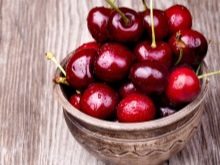
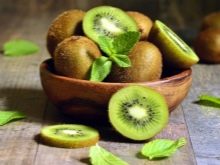
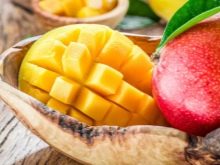
Do not forget that all fruits must be thoroughly washed, no matter where they are purchased or even grown on your site. It is very important to acquire ripe fruits. Dried fruits from stores, if they are previously candied, are unsuitable for parrots, so they should not be bought.
Imported fruits are brought unripe, feeding with such fruits will lead to severe poisoning. Do not give any fruit if you are not sure that it is fully ripe.
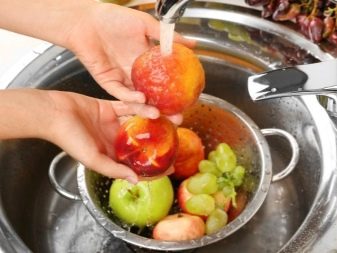
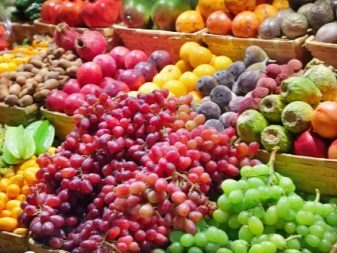
Prohibited Fruit List
Very often the owners of parrots believe that the bird itself knows better how much and what it should eat. Ornithologists nevertheless warn: even if a pet is willing to absorb any food from the general table, this does not mean that he is right. Many of the foods consumed by humans are not at all suitable for the food of a budgie. Here are the fruits that birds should not be given under any circumstances.
Avocado - this fruit, so beloved by many, is one of the many causes of death of birds, because it contains persin - a very toxic element that leads to the death of birds. Seeds of apples and pears, seeds of plums, nectarine, apricot, peach and large berries are very dangerous for parrots, because they contain cyanide, which is one of the most toxic substances and causes severe poisoning.
In order not to confuse which bones can and cannot be consumed, you just need to remove them for safety reasons. An exception may be a grape.
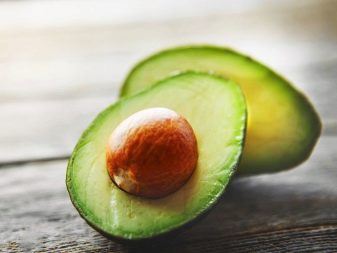
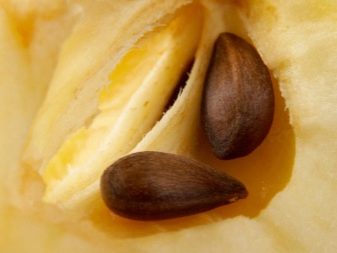
Why doesn't a parrot eat fruit?
Many owners of budgerigars are faced with this problem and do not know what can be done to make the bird begin to eat differently. A common reason is the bird’s fear of the unknown and new, because most often in stores and bird markets parrots are given either food or different seeds, not really caring how the bird feels. With this mode of feeding, addiction occurs, and the feathered one does not want to eat anything else.
Just show your friend that you can be trusted, show by your example which fruits are delicious. If you do not like the type of fruit, change it - make mashed potatoes, juices, dry, knead and soak the fruit.
You will see how, after some time, your bird will understand that fruit is a real treat.
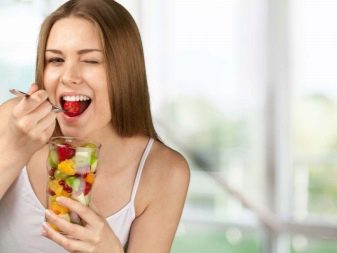
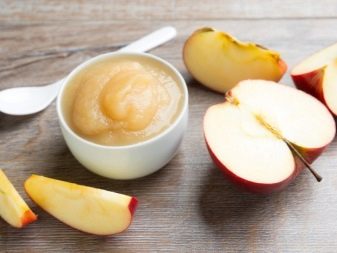
About what fruits can be given to budgies, see the next video.
